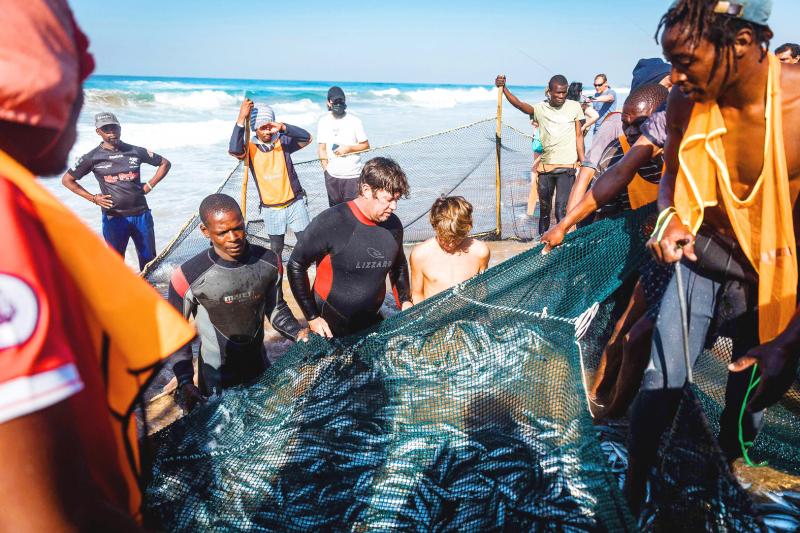Dolphins gracefully popped out of the water, peppering the Indian Ocean’s surface, as sharks rose from the depths and birds dove from the sky — all on the hunt for sardines.
In the crisp air of winter, South Africa’s east coast becomes home to a spectacular annual migration of millions of sardines.
The “sardine run” — which lasts several months and usually peaks in July — attracts a host of marine predators, resulting in a feeding frenzy.

Photo: AFP
“This is a super-pod of common dolphins,” marine biologist Michelle Carpenter said, while perching on the side of a boat as three dolphins dove perfectly synchronized just off the bow.
As the ripples of foamy waters rolled through, a flurry of Cape gannets tucked in their wings in succession, diving from the clear blue skies like arrows into the dark waves.
A shape-shifting silvery ball of sardines grouped together glided through the water in unison below the waves: a “bait ball.”

Photo: AFP
Separated from the main shoal, which can be several kilometers long, they were surrounded and then herded up to the surface by the dolphins.
The feasting could begin.
This choreographed dance of nature is possible because of the symbiotic relationship between the different predators.
“Sardines are always looking for depth, for protection ... so they try to go down deep. That’s where the sharks come in,” professional diver Gary Snodgrass said. “So you have the sharks at the bottom and the dolphins around the edges, basically stopping the sardines from running away.”
Then, the most menacing guest arrived, a dusky shark with its fear-inducing dorsal fin, stealthily weaving its way into the banquet feast.
Under the surface, wetsuit-clad spectators kept their distance, watching the feeding frenzy as the sardines frantically tried to escape.
However, within minutes, their shoal was decimated — the dining ended and the guests took their leave.
Their binge was to be repeated over and over during the three to four months of the migration — until the sardines disappear back into the open ocean.
The reason behind the “sardine run” is not exactly known, but scientists believe that it is linked to their reproductive cycle.
Those who saw the feast from under the waves took away indelible memories.
“Amazing,” said French diver Laurent, who did not give his surname. “The shark was the cherry on the cake — incredible. The shark didn’t bite us. It was the best time ever.”
As calm returned to the sea’s surface, a silvery constellation of fish scales trickled like stardust into the deep.

A string of rape and assault allegations against the son of Norway’s future queen have plunged the royal family into its “biggest scandal” ever, wrapping up an annus horribilis for the monarchy. The legal troubles surrounding Marius Borg Hoiby, the 27-year-old son born of a relationship before Norwegian Crown Princess Mette-Marit’s marriage to Norwegian Crown Prince Haakon, have dominated the Scandinavian country’s headlines since August. The tall strapping blond with a “bad boy” look — often photographed in tuxedos, slicked back hair, earrings and tattoos — was arrested in Oslo on Aug. 4 suspected of assaulting his girlfriend the previous night. A photograph

‘GOOD POLITICS’: He is a ‘pragmatic radical’ and has moderated his rhetoric since the height of his radicalism in 2014, a lecturer in contemporary Islam said Abu Mohammed al-Jolani is the leader of the Islamist alliance that spearheaded an offensive that rebels say brought down Syrian President Bashar al-Assad and ended five decades of Baath Party rule in Syria. Al-Jolani heads Hayat Tahrir al-Sham (HTS), which is rooted in Syria’s branch of al-Qaeda. He is a former extremist who adopted a more moderate posture in order to achieve his goals. Yesterday, as the rebels entered Damascus, he ordered all military forces in the capital not to approach public institutions. Last week, he said the objective of his offensive, which saw city after city fall from government control, was to

The US deployed a reconnaissance aircraft while Japan and the Philippines sent navy ships in a joint patrol in the disputed South China Sea yesterday, two days after the allied forces condemned actions by China Coast Guard vessels against Philippine patrol ships. The US Indo-Pacific Command said the joint patrol was conducted in the Philippines’ exclusive economic zone by allies and partners to “uphold the right to freedom of navigation and overflight “ and “other lawful uses of the sea and international airspace.” Those phrases are used by the US, Japan and the Philippines to oppose China’s increasingly aggressive actions in the

‘KAMPAI’: It is said that people in Japan began brewing rice about 2,000 years ago, with a third-century Chinese chronicle describing the Japanese as fond of alcohol Traditional Japanese knowledge and skills used in the production of sake and shochu distilled spirits were approved on Wednesday for addition to UNESCO’s Intangible Cultural Heritage list, a committee of the UN cultural body said It is believed people in the archipelago began brewing rice in a simple way about two millennia ago, with a third-century Chinese chronicle describing the Japanese as fond of alcohol. By about 1000 AD, the imperial palace had a department to supervise the manufacturing of sake and its use in rituals, the Japan Sake and Shochu Makers Association said. The multi-staged brewing techniques still used today are